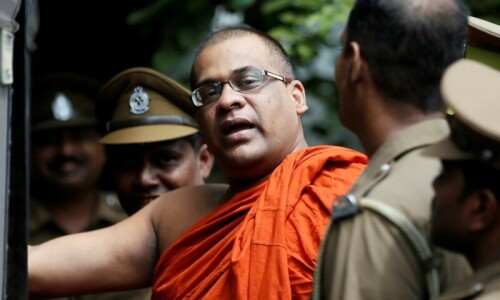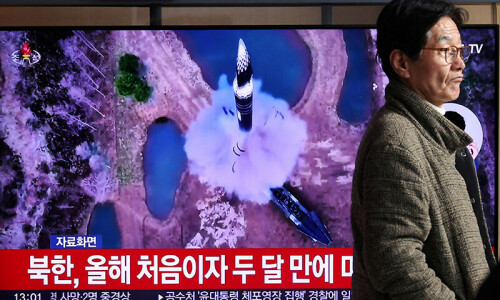“Protest that endures, I think,” the American writer Wendell Berry once wrote, “is moved by a hope far more modest than that of public success: namely, the hope of preserving qualities in one’s own heart and spirit that would be destroyed by acquiescence.”
I’ve quoted that line many times before, including in this space in reference to the martyred Kashmiri human rights lawyer Jalil Andrabi. Berry’s words are on my mind perpetually these days. Many things I cherished have been irretrievably lost over the 46 years I’ve been on the planet, and I’ve come to feel that coming to terms with the inevitability of loss – whether of tangible things or political battles – is a necessary survival skill. The trick is to develop that skill without becoming either defeatist or bitter. It’s not easy.
The people – and I mean here Pakistanis, Americans, and plenty of others – who would insist that the world must be run according to the rules of brute power, paranoia, and enmity, might well prevail over the short term. A lot is being lost in the process, including both the Pakistan and the America that I love, and there seems to be little that you or I can do about the direction or velocity of events. One thing I’ve decided I can do is simply to bear witness, which is why I plan to spend this autumn driving around America, researching a book about my own country similar in spirit to the two books of narrative travel that I’ve written about Pakistan. In both cases, my explicit personal purpose is to listen to and retell human stories, and my largely unstated political purpose is to undermine official and conventional – which is to say fake – versions of reality.
The creeping coup that’s been in progress in America at least since a compromised Supreme Court selected George W. Bush as president after the disputed 2000 election might well reach fruition with the election later this year. If so, they stand to do a lot more damage, both domestically and internationally. What they can’t do is make me believe anything I know to be untrue or get with a program of which I disapprove. And what I can do in opposition is to maintain and communicate a personal understanding of the times we’re living through that’s based on integrity, hard work, and ground-level experience. This is what I consider the real task of any real writer, and it’s what I try to do in this column, as well as in my books.
These musings have wandered a bit far afield from what prompted them, which is the article Talking Tough to Pakistan: How to End Islamabad’s Defiance by Stephen D. Krasner, in the January/February 2012 issue of the journal Foreign Affairs. Krasner’s bio mentions that he is a Senior Fellow (whatever that is) at the right-wing Hoover Institution, and that he was Director of Policy Planning at the US State Department in 2005-7, which is to say during the Bush regime. Foreign Affairs is the house organ of the American foreign policy establishment. What and whom it publishes reflects and helps guide the direction of US foreign policy or, more precisely, the debates of the official and quasi-official US establishment over the direction of US policy. Its purpose is to give intellectual credibility, often tantamount to intellectual cover, to American intentions, and to define and enforce the boundaries of allowable debate on any country, region, or subject of interest to the American imperial state.
What Krasner considers the “obvious conclusion” is that “Pakistan should be treated as a hostile power.” He allows that the ostensible alliance between America and Pakistan “has produced a few modest successes” such as “drone strikes from bases in Baluchistan” (!), but expresses exasperation that “despite the billions of dollars the United States has given Pakistan, public opinion there remains adamantly anti-American.” Imagine that. He patronisingly refers to Pakistan’s “behavior” and offers punitive, paternalistic solutions: “The only way the United States can actually get what it wants out of Pakistan is to make credible threats to retaliate if Pakistan does not comply with US demands and offer rewards only in return for cooperative actions taken. … Even as the United States threatens disengagement, it should emphasise that it would still prefer a productive relationship. But it should also make clear that the choice is Pakistan’s.” In other words, come on, be a team player – on my team.
There are risks in engaging at all with such twaddle, but it’s a dangerous twaddle, because it’s published in Foreign Affairs. Ignoring it carries greater risks. I have the impression that its publication at the start of a calendar year that might well end with another Republican presidential victory signals something ominous about the direction in which US policy toward Pakistan is moving.
There’s not much I can do about that, with my small voice and limited audience. What I can do is to protest, in order to preserve qualities in my own heart and spirit that would be destroyed by acquiescence. By doing that, I do my small part to preserve humanity in an inhuman time. I live and write in the hope that others in both America and Pakistan are doing the same. We will need that resource in order to rebuild after the dust clears.

The views expressed by this blogger and in the following reader comments do not necessarily reflect the views and policies of the Dawn Media Group.












































